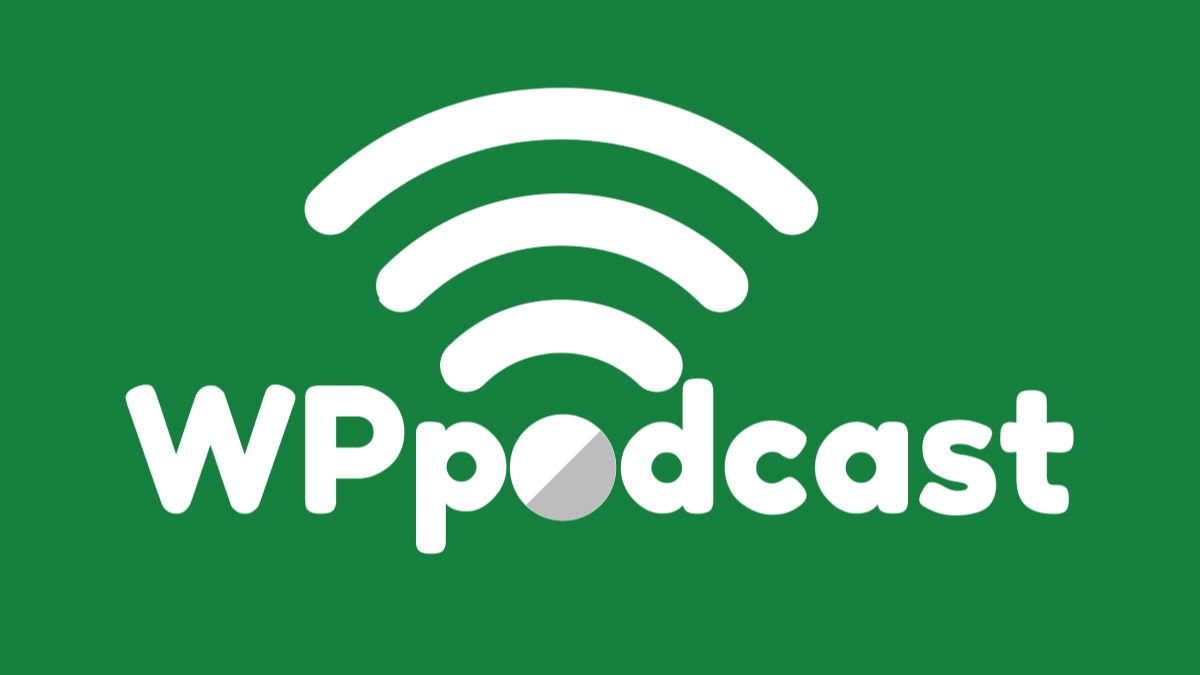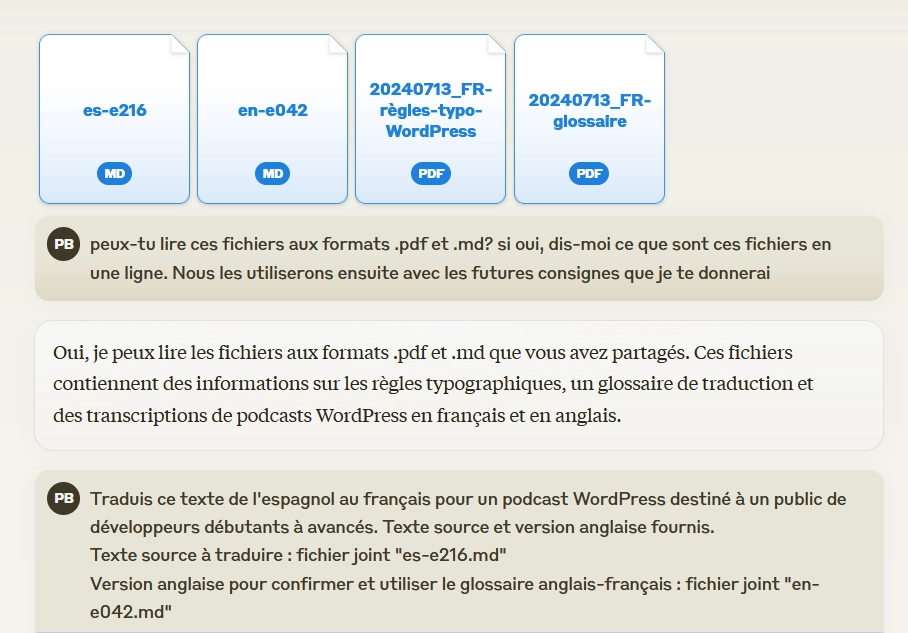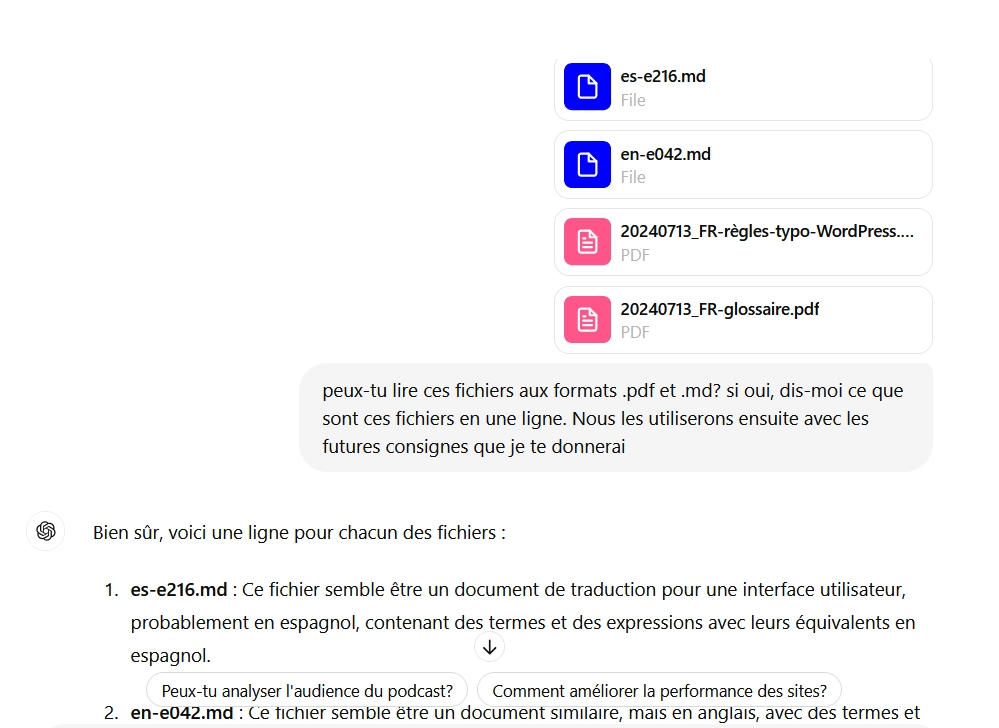The context
Translations! I’m passionate about languages and linguistics. What matters most to me is bringing content to people in their own language! That’s also something I want to implement on my professional projects WPMondo, Interaction.Site and Web Presence Care (opening on 24 July, previously called Virtuaza), even though I chose to write this blog in English only.
What could be better than working with and for people who speak other languages? There’s nothing like bringing content to people in their own language. Communication at its best! I’m also soon creating new post categories on this blog to cover language-related topics.
WordPress is used in the whole world and more than half are installed in another language than English. Thus, it is important that people can read and listen to news about WordPress in other languages.
That’s why I joined the WPpodcast team last November.
I am the translator and the French voice for WPodcast.fr, the weekly news bulletin about the Make WordPress teams, originally in Spanish, by Javier Casares.

The Why
Why am I doing that? (for free of course). Well, as said above, to be part of a project that brings knowledge to people in their own language. On a personal level, it helps me keep track of everything that’s going on in the WordPress Make Teams, and I’m learning a LOT by doing this! For example, when there is a topic about a Gutenberg experiment, I immediately want to test it on my crash site!
The What
From July 2020 until October 2023, Javier Casares produced the Spanish version. In October 2023, he added a version translated to English, then Josep Morán joined with a Catalan version and I joined with the French version in November 2023.
Since, we have been joined by Simon Kraft for German, Enric Pineda for Esperanto and Nakul Chandra for Hindi.
We hope to add more languages soon (at the time of writing, we are awaiting for replies for Arabic, Hebrew and Portuguese). If you speak any of those last 3 languages or Esperanto or any other, please join us by contacting Javier by direct message on the WordPress Make Slack.
French community: I want to mention that Jenny Dupuy is my backup for French if I’m not available, and she recorded the 9 April French episode when I had lost my voice 😅. Merci Jenny 🥰. I would recommend all team members to have such a person for their language.
Also many thanks to the French Polyglots, such as JB, FX, Laurent, Valérie, Sébastien, Bruno, etc., who, in addition to Jenny, help me in the French WordPress Slack when I’m not sure of a word! I want to stay as close as possible to the words usually decided by the French Polyglots team.
Two other details about languages:
- From the 15 July 2024, Javier has the English audio voice done by Alicia Ireland (AI),
- As I’m learning Esperanto (and other languages), I stepped up on 22 July to record the Esperanto episode as the person usually doing it is temporarily unavailable. Of course I used ClaudeAI to translate the text (see below, same process as French). I try to pronounce Esperanto as I learn it on Duolingo 😅.
- Even Josepha Haden-Chomphosy (and probably even Matt) heard about it and said to me (and others in the team) at WordCamp Europe “oh you’re part of that international WordPress podcast“!
Yes! and that’s important, we’re international and we’re talking about WordPress, which powers 43% of the web and in so many different languages, for people from so many different horizons!
The How
Problems
In the beginning, it took me several hours on Mondays to translate the podcast text, although I used a mixture of ChatGPT and DeepL to come up with a first draft in French that I still had to heavily edit. I also sometimes got lost in the technical terms and had to search through all the related articles. Fortunately, Javier then came to the conclusion that no big things were usually happening in the Make Teams on week-ends and we now get the Spanish and English versions on Saturdays. That gives me three full days to translate and record, and there’s no problem if the episode is occasionally published later in the week (thanks Javier for the flexibility!).
Until now, I have used ChatGPT (Pro account, versions 4.0 then 4o) to get the first translation and completely rework the text every week, as I didn’t manage to have it create a proper French text that made sense. I tried all sort of prompt engineering, as of course we know that simply saying “translate that” won’t get you any good results.
Even with good prompts, training and instructions, including uploading the French Glossary and Typopography guide available for French WordPress Polyglots (if you are not a WordPress contributor: Polyglots is the name of the Team which translate WordPress and its plugins, themes, etc), ChatGPT never gave me a satisfying result.
For example, for “plugins” we say “extensions” in French, it’s in the official French WordPress Glossary and the stubborn ChatGPT always kept “plugins” in the French text. And when telling to it “you didn’t use extensions instead of plugins as instructed”, I always got the usual ChatGPT’s “I’m sorry/you’re right” but it kept doing it, even in the same conversation.
There is also a problem with inclusive language. In French, it’s very important to say for example “développeurs et développeuses” or transform to a verb “les personnes qui développent” for the masculine and the feminine forms to be taken care of. It’s the same for the corresponding adjectives. I kept asking for it but ChatGPT couldn’t do it.
Also in French (and English), we are using much shorter sentences than Spanish, so I asked to separate original sentences that had too many subordinate or sub-sentences.
Experiment a possible solution
On 13 July 2024, I began experimenting with alternative solutions for the 15 July episode.
I had just seen an episode on YouTube called “Je teste le nouveau Claude […]” by Ludo Salenne, THE AI expert in France! I’m a huge fan of Ludo’s work and even bought his premium course last year when it was launched for 1/4 of the price.
I thus tried ClaudeAI by Anthropic (hereafter: Claude) instead of ChatGPT, and navigated between the two, using ChatGPT to critique and improve the original prompt created by Claude.
The prompts below are in French, you can translate them (with Claude 😬).
Prompt 1
I uploaded the 2 pdf I made from those 2 pages “Glossaire” and “Les règles typographiques utilisées pour la traduction de WordPress“
as well as the 2 .md files (podcast’s .md files in Spanish and English given on Saturday by Javier for the episode to be published on Monday evening)
and asked:
peux-tu lire ces fichiers aux formats .pdf et .md? si oui, dis-moi ce que sont ces fichiers en une ligne. Nous les utiliserons ensuite avec les futures consignes que je te donneraiClaude’s reply:
Oui, je peux lire les fichiers aux formats PDF et MD que vous avez partagés. Ces fichiers contiennent des règles typographiques en français, un glossaire anglais-français de termes WordPress, et des transcriptions de podcasts WordPress en espagnol et en anglais.Prompt 2
Traduis ce texte de l'espagnol au français pour un podcast WordPress destiné à un public de développeurs débutants à avancés. Texte source et version anglaise fournis.
Texte source à traduire : fichier joint "es-e215.md"
Version anglaise pour confirmer et utiliser le glossaire anglais-français : fichier joint "en-e041.md"
Glossaire : fichier joint "20240713_FR-glossaire.pdf"
Règles typographiques à suivre : fichier joint "20240713_FR-règles-typo-WordPress.pdf"
Consignes :
- Adapte au format podcast : phrases courtes, style oral clair.
- Vise un registre semi-formel, accessible mais professionnel.
- Longueur cible : 90-110% du texte source.
- Privilégie la clarté et l'exactitude technique sur la fidélité littérale.
- Utilise le glossaire fourni. Pour les termes absents, propose une traduction et signale-la.
- Attention à ces termes en particulier, dans certains cas "support" = "prise en charge", par exemple "version prise en charge", faire la différence avec support qui veut dire aider et qui reste support en français.
- Ne traduis pas les noms des équipes marquées en gras (entourées par 2 astérisques).
- Laisse tous les liens originels.
- Utilise un langage épicène, par exemple "que vous soyez développeur ou utilisateur" devient "que vous développiez ou utilisiez", ou si ce n'est pas possible, ajout de "développeurs et développeuses" et "utilisateurs et utilisatrices", pareil pour tous les termes qui peuvent avoir un féminin pour les personnes.
- Adapte la ponctuation pour la lecture à voix haute.
- Remplace les références culturelles par des équivalents français si nécessaire.
- Conserve les acronymes courants, développe les autres.
- Assure-toi que le texte soit agréable à l'oreille (évite les cacophonies).
- Reformule les métaphores si elles ne fonctionnent pas en français.
- Signale et corrige les éventuelles erreurs du texte source.
- Pour les passages ambigus, fournis la meilleure interprétation et signale l'ambiguïté.
- Uniformise le style et la terminologie tout au long du texte.
- Crée ta réponse au format Markdown .md
- Propose des alternatives pour les passages problématiques. Si des clarifications sont nécessaires, indique-le clairement.New experiment
When I got the Spanish and English files on 20 July 2024 for the 22 July episode, I decided to share my process with the other translators in our group chat, and compare the results from both Claude and ChatGPT. I tried with the new WPpodcast episode with the EXACT same prompts in Claude and ChatGPT (exactly same as above).


Results and comparison
Glossary use
- ChatGPT didn’t use the Glossary even though it confirmed it could read it and even explained what was that file. So plugins stays plugins 😅 and “patterns” to “motifs” (which doesn’t exist in the glossary, we say “compositions” 👎) .
- Claude correctly translates “plugins” to “extensions”, “templates” to “compositions”, etc. 👍 but strangely replaced “page” by “modèle” which is template (why?) 👎
Team names
They both translated the team names even though it’s said in the prompt not to when in .md bold (between 2 asterisks). 👎
Use of inclusive language
Instructed in the prompt!
- ChatGPT didn’t use inclusive language and translated “developers” to “développeurs” only and same for “attendees” to “participants” only, etc 👎 but managed to translate correctly “contributors” to “contributeurs et contributrices” 👍 (and no trace of “users” as it forgot one complete paragraph, see below).
- Claude correctly translated “developers” to “développeurs et développeuses”, “users” to “utilisateurs et utilisatrices”, “contributors” to “contributeurs et contributrices” and “attendees” to “participants et participantes”. 👍
In addition, ChatGPT did not respect the paragraph separations from the original Spanish and English source files, stacking together unrelated topics.
Above all, and this is the worst: it completely removed entire paragraphs!! (maybe because I ask to rephrase in the prompt?). For example no trace of the “summary of the WordCamp Europe Contributor Day” and attendees recurrence in the ChatGPT result. Disappeared!! 👎
Clarity and syntax
I said in the prompt to create short concise sentences, in oral style.
Here is an example with the Spanish and English sentences (in the opinion of 2 British persons I asked, it’s way too long in English as well, it must be the Spanish style? 😜)
Javier’s original Spanish sentence from the received Spanish file which I then uploaded to ChatGPT and Claude:
Este lanzamiento introduce mejoras significativas en diseño, rendimiento y accesibilidad, permitiendo crear combinaciones de diseño variadas mediante conjuntos de colores y fuentes, y ofrece un nuevo diseño en el Editor del Sitio para previsualizar páginas rápidamente
Javier’s translation to English, from the received English file which I then uploaded to ChatGPT and Claude:
This release introduces significant improvements in design, performance, and accessibility, allowing for varied design combinations using color and font sets, and offers a new Site Editor design for quickly previewing pages.
ChatGPT result in French, it’s too long with 3 sub-sentences separated by commas: 👎
Cette version apporte des améliorations significatives en termes de design, de performance et d'accessibilité, permettant des combinaisons de design variées grâce aux ensembles de couleurs et de polices, et offre un nouveau design de l'Éditeur de Site pour prévisualiser rapidement les pages.Claude separated in shorter sentences as instructed and created 2 sentences, the second one with 2 sub-sentences only: 👍
Cette version introduit des améliorations significatives en matière de design, de performances et d'accessibilité. Elle permet de créer diverses combinaisons de design grâce à des ensembles de couleurs et de polices, et offre une nouvelle conception de l'éditeur de site pour prévisualiser rapidement les pages.My final changes, as I added to the episode transcript and recorded:
Cette version apporte des améliorations significatives en matière de design, de performances et d'accessibilité. Elle permet de créer diverses combinaisons de design grâce à des ensembles de couleurs et de polices, et offre une nouvelle conception de l'éditeur de site permettant une prévisualisation rapide des pages.And it’s like that throughout the text: too long sentences with ChatGPT and sometimes garbage French.
In short, I’ll use both and continue to check everything, but for sure Claude saves me a lot of time compared to ChatGPT where every sentence has to be reworded.
If you are good at prompt engineering, please comment!!
Machine VS Human


Copyright © Michelle Bulloch
For the time being, AI translations are far from matching human translations or, at least, human revision and editing, especially for professional translations. We are still far from 1984 Terminator, 1982 Blade Runner’s replicants and even from Star Wars R2-D2! But language models are progressing fast!
For example, my friend Michelle Bulloch at Musitext is translating and writing programme notes for classical concerts and various articles in the cultural field. She has a background in classical music, worked as a journalist in Geneva, as a French and English teacher in the German-speaking part of Switzerland, then started offering web design services in addition to her translation and writing offers, hence the name Musitext. Michelle is now also part of my WPMondo (edited, now CMSMondo), Interaction.Site and Web Presence Care projects.
Michelle also contributes to WordPress by co-organising WordPress events in Switzerland since many years, including WordCamp and Community Day events, and runs the new Lucerne Meetup group. She joined the WordCamp Europe 2024 organising team in the Volunteer Team and is now part of the WordCamp Europe 2025 Local team, both with me. She also sometimes contributes to the French Polyglots team, translating WordPress plugins into French.
If you need a human made professional translation, please consider Michelle! She is way better than any AI.
But of course for WPpodcast, a free project, we have to do it ourselves…

Leave a Reply